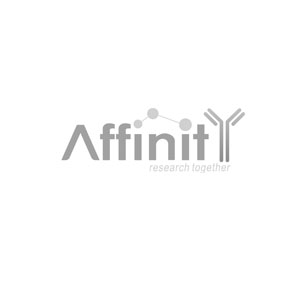ABCF1 Antibody - #DF3815
| Product: | ABCF1 Antibody |
| Catalog: | DF3815 |
| Description: | Rabbit polyclonal antibody to ABCF1 |
| Application: | WB IF/ICC |
| Reactivity: | Human, Mouse, Rat |
| Prediction: | Pig, Zebrafish, Bovine, Horse, Sheep, Rabbit, Dog, Xenopus |
| Mol.Wt.: | 95kDa; 96kD(Calculated). |
| Uniprot: | Q8NE71 |
| RRID: | AB_2836172 |
Product Info
*The optimal dilutions should be determined by the end user.
*Tips:
WB: For western blot detection of denatured protein samples. IHC: For immunohistochemical detection of paraffin sections (IHC-p) or frozen sections (IHC-f) of tissue samples. IF/ICC: For immunofluorescence detection of cell samples. ELISA(peptide): For ELISA detection of antigenic peptide.
Cite Format: Affinity Biosciences Cat# DF3815, RRID:AB_2836172.
Fold/Unfold
ABC27; ABC50; ABCF1; ABCF1_HUMAN; ATP binding cassette 50 (TNF alpha stimulated); ATP binding cassette 50; ATP binding cassette sub family F member 1; ATP binding cassette, sub family F (GCN20), member 1; ATP-binding cassette 50; ATP-binding cassette sub-family F member 1; AU041969; D17Wsu166e; EST123147; GCN20; TNF alpha stimulated ABC protein; TNF-alpha-stimulated ABC protein; TNFalpha inducible ATP binding protein; wu:fb79c06; wu:fc39a05; wu:fj94a08; zgc:85667;
Immunogens
- Q8NE71 ABCF1_HUMAN:
- Protein BLAST With
- NCBI/
- ExPASy/
- Uniprot
MPKAPKQQPPEPEWIGDGESTSPSDKVVKKGKKDKKIKKTFFEELAVEDKQAGEEEKVLKEKEQQQQQQQQQQKKKRDTRKGRRKKDVDDDGEEKELMERLKKLSVPTSDEEDEVPAPKPRGGKKTKGGNVFAALIQDQSEEEEEEEKHPPKPAKPEKNRINKAVSEEQQPALKGKKGKEEKSKGKAKPQNKFAALDNEEEDKEEEIIKEKEPPKQGKEKAKKAEQGSEEEGEGEEEEEEGGESKADDPYAHLSKKEKKKLKKQMEYERQVASLKAANAAENDFSVSQAEMSSRQAMLENASDIKLEKFSISAHGKELFVNADLYIVAGRRYGLVGPNGKGKTTLLKHIANRALSIPPNIDVLLCEQEVVADETPAVQAVLRADTKRLKLLEEERRLQGQLEQGDDTAAERLEKVYEELRATGAAAAEAKARRILAGLGFDPEMQNRPTQKFSGGWRMRVSLARALFMEPTLLMLDEPTNHLDLNAVIWLNNYLQGWRKTLLIVSHDQGFLDDVCTDIIHLDAQRLHYYRGNYMTFKKMYQQKQKELLKQYEKQEKKLKELKAGGKSTKQAEKQTKEALTRKQQKCRRKNQDEESQEAPELLKRPKEYTVRFTFPDPPPLSPPVLGLHGVTFGYQGQKPLFKNLDFGIDMDSRICIVGPNGVGKSTLLLLLTGKLTPTHGEMRKNHRLKIGFFNQQYAEQLRMEETPTEYLQRGFNLPYQDARKCLGRFGLESHAHTIQICKLSGGQKARVVFAELACREPDVLILDEPTNNLDIESIDALGEAINEYKGAVIVVSHDARLITETNCQLWVVEEQSVSQIDGDFEDYKREVLEALGEVMVSRPRE
Predictions
Score>80(red) has high confidence and is suggested to be used for WB detection. *The prediction model is mainly based on the alignment of immunogen sequences, the results are for reference only, not as the basis of quality assurance.
High(score>80) Medium(80>score>50) Low(score<50) No confidence
PTMs - Q8NE71 As Substrate
| Site | PTM Type | Enzyme | Source |
|---|---|---|---|
| K6 | Ubiquitination | Uniprot | |
| S20 | Phosphorylation | Uniprot | |
| T21 | Phosphorylation | Uniprot | |
| S22 | Phosphorylation | Uniprot | |
| S24 | Phosphorylation | Uniprot | |
| K26 | Ubiquitination | Uniprot | |
| K39 | Ubiquitination | Uniprot | |
| K50 | Ubiquitination | Uniprot | |
| S105 | Phosphorylation | Uniprot | |
| T108 | Phosphorylation | Uniprot | |
| S109 | Phosphorylation | P68400 (CSNK2A1) | Uniprot |
| S140 | Phosphorylation | P68400 (CSNK2A1) | Uniprot |
| K163 | Acetylation | Uniprot | |
| K163 | Methylation | Uniprot | |
| S166 | Phosphorylation | Uniprot | |
| K174 | Methylation | Uniprot | |
| K174 | Ubiquitination | Uniprot | |
| K176 | Methylation | Uniprot | |
| K209 | Ubiquitination | Uniprot | |
| S228 | Phosphorylation | Uniprot | |
| S244 | Phosphorylation | Uniprot | |
| Y250 | Phosphorylation | Uniprot | |
| S254 | Phosphorylation | Uniprot | |
| K255 | Ubiquitination | Uniprot | |
| K263 | Ubiquitination | Uniprot | |
| Y267 | Phosphorylation | Uniprot | |
| S273 | Phosphorylation | Uniprot | |
| K275 | Methylation | Uniprot | |
| K275 | Ubiquitination | Uniprot | |
| S287 | Phosphorylation | Uniprot | |
| K305 | Ubiquitination | Uniprot | |
| K308 | Ubiquitination | Uniprot | |
| Y332 | Phosphorylation | Uniprot | |
| T343 | Phosphorylation | Uniprot | |
| T344 | Phosphorylation | Uniprot | |
| K347 | Ubiquitination | Uniprot | |
| K389 | Ubiquitination | Uniprot | |
| T407 | Phosphorylation | Uniprot | |
| K414 | Ubiquitination | Uniprot | |
| Y416 | Phosphorylation | Uniprot | |
| T422 | Phosphorylation | Uniprot | |
| K430 | Ubiquitination | Uniprot | |
| K451 | Ubiquitination | Uniprot | |
| K537 | Methylation | Uniprot | |
| K549 | Ubiquitination | Uniprot | |
| Y551 | Phosphorylation | Uniprot | |
| K573 | Ubiquitination | Uniprot | |
| K576 | Ubiquitination | Uniprot | |
| T580 | Phosphorylation | Uniprot | |
| K582 | Ubiquitination | Uniprot | |
| K589 | Ubiquitination | Uniprot | |
| S595 | Phosphorylation | Uniprot | |
| K603 | Ubiquitination | Uniprot | |
| S621 | Phosphorylation | Uniprot | |
| S652 | Phosphorylation | Uniprot | |
| S665 | Phosphorylation | Uniprot | |
| T666 | Phosphorylation | Uniprot | |
| T672 | Phosphorylation | Uniprot | |
| T676 | Phosphorylation | Uniprot | |
| T678 | Phosphorylation | Uniprot | |
| K689 | Ubiquitination | Uniprot | |
| Y710 | Phosphorylation | Uniprot | |
| K748 | Ubiquitination | Uniprot |
Research Backgrounds
Isoform 2 is required for efficient Cap- and IRES-mediated mRNA translation initiation. Isoform 2 is not involved in the ribosome biogenesis.
Isoform 2 is phosphorylated at phosphoserine and phosphothreonine. Isoform 2 phosphorylation on Ser-109 and Ser-140 by CK2 inhibits association of EIF2 with ribosomes.
Cytoplasm. Nucleus>Nucleoplasm. Nucleus envelope.
Ubiquitous.
Isoform 2 interacts (via N-terminus) with EIF2S1; the interaction is independent of its phosphorylated status. Isoform 2 associates (via both ABC transporter domains) with the ribosomes.
Belongs to the ABC transporter superfamily. ABCF family. EF3 subfamily.
Restrictive clause
Affinity Biosciences tests all products strictly. Citations are provided as a resource for additional applications that have not been validated by Affinity Biosciences. Please choose the appropriate format for each application and consult Materials and Methods sections for additional details about the use of any product in these publications.
For Research Use Only.
Not for use in diagnostic or therapeutic procedures. Not for resale. Not for distribution without written consent. Affinity Biosciences will not be held responsible for patent infringement or other violations that may occur with the use of our products. Affinity Biosciences, Affinity Biosciences Logo and all other trademarks are the property of Affinity Biosciences LTD.
